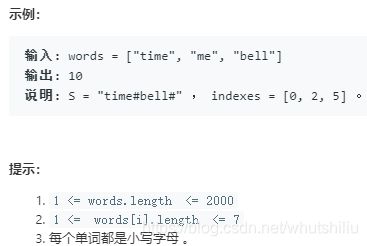一、题目658.找到K个最接近的元素给定一个排序好的数组arr,两个整数k和x,从数组中找到最靠近x(两数之差最小)的k个数。返回的结果必须要是按升序排好的。整数a比整数b更接近x需要满足:|a-x|<|b-x|或者|a-x|==|b-x|且a
leetcode 658. 找到 K 个最接近的元素
leetcode658.找到K个最接近的元素题目描述:给定一个排序好的数组arr,两个整数k和x,从数组中找到最靠近x(两数之差最小)的k个数。返回的结果必须要是按升序排好的。整数a比整数b更接近x需要满足:|a-x|findClosestElements(vector&arr,intk,intx){intn=arr.size()-1;intl=0,r=n;k--;while(r-l>k){if(
【二分查找】leetcode 658. 找到 K 个最接近的元素
lele_ne
#双指针#二分查找算法之路leetcode算法数据结构
658.找到K个最接近的元素题目描述给定一个排序好的数组arr,两个整数k和x,从数组中找到最靠近x(两数之差最小)的k个数。返回的结果必须要是按升序排好的。整数a比整数b更接近x需要满足:|a-x|arr[right]−xx-arr[left]>arr[right]-xx−arr[left]>arr[right]−x,右指针上的元素存入数组,并向右移动;如果右指针已经移动到超过数组arr的长度,
Leetcode 658. 找到k个最接近的元素
皮卡猴
leetcode刷题leetcode算法排序算法
Leetcode658.找到k个最接近的元素1.问题描述2.思路 按照递增序列,找到x应该插入的位置index。以此为中心,向两侧扩展长度为k的空间,该空间内的元素就是我们想要的元素。1二分查找,找到满足=0,且jlen(arr)-1,向左移动i3.代码3.1第一次运行成功funcfindClosestElements(arr[]int,kint,xint)[]int{varres[]intin
Python关于pandas的基础知识
WeiJingYu.
pythonpandas开发语言
一.扫盲(一)、pandas是什么pandas是Python的一个第三方数据处理库,它提供了高效、灵活的数据结构(如Series和DataFrame),能方便地对结构化数据进行清洗、转换、分析和处理。(二)、pandas与NumPy的关系NumPy是Python中用于科学计算的基础库,主要用于存储和处理数值型数组。但它有一个局限,就是不能直接存储和处理字符串等非数值类型的数据。而pandas是在N
oracle空格的转义字符串,Oracle 单引号 双引号 转义符 分隔符
sleepsoft
oracle空格的转义字符串
概述单引号用来标记字符串双引号用来标记识别对象名以下使用会比较绕:字符串中出现单引号、双引号;表或字段等对象的别名(alias)中出单引号、双引号;单引号、双引号与空格一起使用;双引号双引号的作用是:假如建立对象的时候,对象名、字段名加双引号,则示意Oracle将严格区分大小写,否则Oracl都默认大写。[][1]单引号、双引号、字符串、Oracle10g之前,字符串中出现单引号,可以用两个单引号
python双引号打不出来_在python 3中使用单引号和双引号时出错 - python
weixin_39897749
python双引号打不出来
使用os.system()函数时,我在python中遇到了EOL错误。以下是代码行生成错误:os.system("catsubdomains.txt|cut-d'"'-f1")基本上,我试图使用分号[“]修改输出字符串(双引号)参考方案如果需要在带"的字符串中编写",则可以将其写为\""catsubdomains.txt|cut-d'\"'-f1"在PythonCloudFunction中使用错误
LeetCode 25. K 个一组翻转链表 java题解
反转链表进阶版题目https://leetcode-cn.com/problems/reverse-nodes-in-k-group/代码/***Definitionforsingly-linkedlist.*publicclassListNode{*intval;*ListNodenext;*ListNode(){}*ListNode(intval){this.val=val;}*ListNod
Java 正则表达式详解
BigData_Hubert
java基础正则表达式regexjava
正则表达式乍一看上去是一堆繁琐的、无规律的、令人头大的字符串,但是其简单易学,适用于各种语言;当你了解他之后,你就会知道它的强大。很多程序设计语言都支持用正则表达式来进行字符串的操作。正则表达式简介初识正则表达式正则表达式是使用单个字符串来描述、匹配一系列规则的字符串。正则表达式并不仅限于某一种语言(几乎所有的语言都有字符串),在每种语言中有细微的差别。一个正则表达式字符串:^p[a-zA-Z_]
Go语言面试宝典:50道必会题目与精解_golang面试必问50个问题
2401_86436851
golang面试开发语言
1.指针与引用2.并发编程3.切片与数组4.接口5.垃圾回收6.错误处理7.包管理8.Map9.Defer语句10.类型断言11.并发同步12.接口实现13.错误跟踪14.并发性能15.内存管理16.编译和运行17.泛型18.网络编程19.测试20.代码组织21.Goroutine泄漏22.闭包23.指针与性能24.错误封装25.接口与空接口26.并发错误27.切片操作28.字符串处理29.环境变
JavaScript 类型转换之谜:为什么 [] + 0 = ‘0‘ 而 {} + 0 = 0?
在JavaScript面试中,表达式[]+0和{}+0的结果差异常令人困惑。它们揭示了JavaScript类型转换的核心机制,下面我们深入解析背后的原理。案例一:[]+0='0'(字符串拼接)转换步骤:数组[]转换为原始值JavaScript对对象(包括数组)执行ToPrimitive转换:优先调用valueOf()→返回数组本身(非原始值,继续下一步)调用toString()→空数组转为空字符串
c++读取文件中图像信息并用opencv展示
送分童子笑嘻嘻
#include#include#include#include#include#include#include//usingnamespacestd;usingnamespacecv;//字符串分割函数,std::vectorsplit(std::stringstr,std::stringpattern){std::string::size_typepos;std::vectorresult;s
LeetCode 1471.数组中的k个最强值
吃着火锅x唱着歌
LeetCodeleetcode算法数据结构
给你一个整数数组arr和一个整数k。设m为数组的中位数,只要满足下述两个前提之一,就可以判定arr[i]的值比arr[j]的值更强:|arr[i]-m|>|arr[j]-m||arr[i]-m|==|arr[j]-m|,且arr[i]>arr[j]请返回由数组中最强的k个值组成的列表。答案可以以任意顺序返回。中位数是一个有序整数列表中处于中间位置的值。形式上,如果列表的长度为n,那么中位数就是该有
LeetCode 633.平方数之和(python题解)
wendong97
LeetCode从零起步#双指针leetcodepython算法
LeetCode633.平方数之和(python题解)题目示例分析题解用到的基础知识计算平方和平方根取整参考题目给定一个非负整数c,你要判断是否存在两个整数a和b,使得a2+b2=c示例输入:5输出:True解释:1*1+2*2=5分析本题与上一题LeetCode167.两数之和II非常相似,把两数之和变成了平方数之和,利用上一题答案的思路,同样设置两个一左一右的指针,很容易就可以解答出来。这里要
Leetcode—347. 前 K 个高频元素【中等】(桶排序)
源代码•宸
LeetCode刷题leetcode算法经验分享c++桶排序
2024每日刷题(178)Leetcode—347.前K个高频元素桶排序实现代码classSolution{public:vectortopKFrequent(vector&<
Leetcode刷题笔记——哈希表篇
code_lover_forever
Leetcode刷题笔记leetcode笔记散列表python
Leetcode刷题笔记——哈希表篇一、哈希表在面试中的高频考题第一题:两数之和Leetcode1:两数之和:中等题(详情点击链接见原题)给定一个整数数组nums和一个整数目标值target,请你在该数组中找出和为目标值target的那两个整数,并返回它们的数组下标python代码解法classSolution:deftwoSum(self,nums:List[int],target:int)->
es6中的symbol基础知识
藤原とラふ店丶
es6前端ecmascript
ES6中的Symbol是一种新的原始数据类型(PrimitiveDataType),它代表唯一的、不可变的值。它的主要目的是为了解决属性名冲突的问题,并为对象定义非字符串的属性键(Key)。以下是Symbol的核心特性和用法:1.创建Symbol使用Symbol()函数创建,每次调用都会返回一个独一无二的值:constsym1=Symbol();constsym2=Symbol();console
138. 复制带随机指针的链表
秃头哥编程
2021-07-22LeetCode每日一题链接:https://leetcode-cn.com/problems/copy-list-with-random-pointer/标签:哈希表、链表题目给你一个长度为n的链表,每个节点包含一个额外增加的随机指针random,该指针可以指向链表中的任何节点或空节点。构造这个链表的深拷贝。深拷贝应该正好由n个全新节点组成,其中每个新节点的值都设为其对应的原
19、Java正则表达式与字符集详解
杠精协会主席
JavaNIO:革新I/O处理的新范式Java正则表达式Pattern
Java正则表达式与字符集详解1.Java正则表达式相关类在JavaJ2SE1.4版本中,引入了一些期待已久的正则表达式类,下面为你详细介绍:-CharSequence:这是一个新的接口,由多个类实现,用于以抽象的方式描述字符序列。-Pattern:该类将正则表达式封装在一个不可变的对象实例中。可以通过编译表达式字符串来创建实例,同时还有一些静态实用方法用于一次性匹配。importjava.uti
Python训练营Day2
linaloos
python开发语言
学习内容:在完成第一天任务后,你已经具备执行简单Python代码的能力了,只要有人给你提供正确的代码,你都能够执行。但是离看懂上面AI提供的代码还有一段举例,你需要掌握一些基础内容。编程语言中为什么要使用变量Python中如何定义变量,变量的命名有什么规则编程语言中,逻辑控制的三大支柱是什么Python中数字类型和字符串类型有什么区别Python中还有哪些类型。有些问题需要思考如何进行增删改查,所
华为OD面试手撕真题 - 字符串解码 (C++ & Python & JAVA & JS & GO)
无限码力
华为OD面试手撕代码真题合集华为od面试手撕真题华为OD面试手撕真题
题目描述给定一个经过编码的字符串,返回它解码后的字符串。编码规则为:k[encoded_string],表示其中方括号内部的encoded_string正好重复k次。注意k保证为正整数。你可以认为输入字符串总是有效的;输入字符串中没有额外的空格,且输入的方括号总是符合格式要求的。此外,你可以认为原始数据不包含数字,所有的数字只表示重复的次数k,例如不会出现像3a或2[4]的输入。示例1输入:s="
SQL的各种连接查询
xieke90
UNION ALLUNION外连接内连接JOIN
一、内连接
概念:内连接就是使用比较运算符根据每个表共有的列的值匹配两个表中的行。
内连接(join 或者inner join )
SQL语法:
select * fron
java编程思想--复用类
百合不是茶
java继承代理组合final类
复用类看着标题都不知道是什么,再加上java编程思想翻译的比价难懂,所以知道现在才看这本软件界的奇书
一:组合语法:就是将对象的引用放到新类中即可
代码:
package com.wj.reuse;
/**
*
* @author Administrator 组
[开源与生态系统]国产CPU的生态系统
comsci
cpu
计算机要从娃娃抓起...而孩子最喜欢玩游戏....
要让国产CPU在国内市场形成自己的生态系统和产业链,国家和企业就不能够忘记游戏这个非常关键的环节....
投入一些资金和资源,人力和政策,让游
JVM内存区域划分Eden Space、Survivor Space、Tenured Gen,Perm Gen解释
商人shang
jvm内存
jvm区域总体分两类,heap区和非heap区。heap区又分:Eden Space(伊甸园)、Survivor Space(幸存者区)、Tenured Gen(老年代-养老区)。 非heap区又分:Code Cache(代码缓存区)、Perm Gen(永久代)、Jvm Stack(java虚拟机栈)、Local Method Statck(本地方法栈)。
HotSpot虚拟机GC算法采用分代收
页面上调用 QQ
oloz
qq
<A href="tencent://message/?uin=707321921&Site=有事Q我&Menu=yes">
<img style="border:0px;" src=http://wpa.qq.com/pa?p=1:707321921:1></a>
一些问题
文强chu
问题
1.eclipse 导出 doc 出现“The Javadoc command does not exist.” javadoc command 选择 jdk/bin/javadoc.exe 2.tomcate 配置 web 项目 .....
SQL:3.mysql * 必须得放前面 否则 select&nbs
生活没有安全感
小桔子
生活孤独安全感
圈子好小,身边朋友没几个,交心的更是少之又少。在深圳,除了男朋友,没几个亲密的人。不知不觉男朋友成了唯一的依靠,毫不夸张的说,业余生活的全部。现在感情好,也很幸福的。但是说不准难免人心会变嘛,不发生什么大家都乐融融,发生什么很难处理。我想说如果不幸被分手(无论原因如何),生活难免变化很大,在深圳,我没交心的朋友。明
php 基础语法
aichenglong
php 基本语法
1 .1 php变量必须以$开头
<?php
$a=” b”;
echo
?>
1 .2 php基本数据库类型 Integer float/double Boolean string
1 .3 复合数据类型 数组array和对象 object
1 .4 特殊数据类型 null 资源类型(resource) $co
mybatis tools 配置详解
AILIKES
mybatis
MyBatis Generator中文文档
MyBatis Generator中文文档地址:
http://generator.sturgeon.mopaas.com/
该中文文档由于尽可能和原文内容一致,所以有些地方如果不熟悉,看中文版的文档的也会有一定的障碍,所以本章根据该中文文档以及实际应用,使用通俗的语言来讲解详细的配置。
本文使用Markdown进行编辑,但是博客显示效
继承与多态的探讨
百合不是茶
JAVA面向对象 继承 对象
继承 extends 多态
继承是面向对象最经常使用的特征之一:继承语法是通过继承发、基类的域和方法 //继承就是从现有的类中生成一个新的类,这个新类拥有现有类的所有extends是使用继承的关键字:
在A类中定义属性和方法;
class A{
//定义属性
int age;
//定义方法
public void go
JS的undefined与null的实例
bijian1013
JavaScriptJavaScript
<form name="theform" id="theform">
</form>
<script language="javascript">
var a
alert(typeof(b)); //这里提示undefined
if(theform.datas
TDD实践(一)
bijian1013
java敏捷TDD
一.TDD概述
TDD:测试驱动开发,它的基本思想就是在开发功能代码之前,先编写测试代码。也就是说在明确要开发某个功能后,首先思考如何对这个功能进行测试,并完成测试代码的编写,然后编写相关的代码满足这些测试用例。然后循环进行添加其他功能,直到完全部功能的开发。
[Maven学习笔记十]Maven Profile与资源文件过滤器
bit1129
maven
什么是Maven Profile
Maven Profile的含义是针对编译打包环境和编译打包目的配置定制,可以在不同的环境上选择相应的配置,例如DB信息,可以根据是为开发环境编译打包,还是为生产环境编译打包,动态的选择正确的DB配置信息
Profile的激活机制
1.Profile可以手工激活,比如在Intellij Idea的Maven Project视图中可以选择一个P
【Hive八】Hive用户自定义生成表函数(UDTF)
bit1129
hive
1. 什么是UDTF
UDTF,是User Defined Table-Generating Functions,一眼看上去,貌似是用户自定义生成表函数,这个生成表不应该理解为生成了一个HQL Table, 貌似更应该理解为生成了类似关系表的二维行数据集
2. 如何实现UDTF
继承org.apache.hadoop.hive.ql.udf.generic
tfs restful api 加auth 2.0认计
ronin47
目前思考如何给tfs的ngx-tfs api增加安全性。有如下两点:
一是基于客户端的ip设置。这个比较容易实现。
二是基于OAuth2.0认证,这个需要lua,实现起来相对于一来说,有些难度。
现在重点介绍第二种方法实现思路。
前言:我们使用Nginx的Lua中间件建立了OAuth2认证和授权层。如果你也有此打算,阅读下面的文档,实现自动化并获得收益。SeatGe
jdk环境变量配置
byalias
javajdk
进行java开发,首先要安装jdk,安装了jdk后还要进行环境变量配置:
1、下载jdk(http://java.sun.com/javase/downloads/index.jsp),我下载的版本是:jdk-7u79-windows-x64.exe
2、安装jdk-7u79-windows-x64.exe
3、配置环境变量:右击"计算机"-->&quo
《代码大全》表驱动法-Table Driven Approach-2
bylijinnan
java
package com.ljn.base;
import java.io.BufferedReader;
import java.io.FileInputStream;
import java.io.InputStreamReader;
import java.util.ArrayList;
import java.util.Collections;
import java.uti
SQL 数值四舍五入 小数点后保留2位
chicony
四舍五入
1.round() 函数是四舍五入用,第一个参数是我们要被操作的数据,第二个参数是设置我们四舍五入之后小数点后显示几位。
2.numeric 函数的2个参数,第一个表示数据长度,第二个参数表示小数点后位数。
例如:
select cast(round(12.5,2) as numeric(5,2))
c++运算符重载
CrazyMizzz
C++
一、加+,减-,乘*,除/ 的运算符重载
Rational operator*(const Rational &x) const{
return Rational(x.a * this->a);
}
在这里只写乘法的,加减除的写法类似
二、<<输出,>>输入的运算符重载
&nb
hive DDL语法汇总
daizj
hive修改列DDL修改表
hive DDL语法汇总
1、对表重命名
hive> ALTER TABLE table_name RENAME TO new_table_name;
2、修改表备注
hive> ALTER TABLE table_name SET TBLPROPERTIES ('comment' = new_comm
jbox使用说明
dcj3sjt126com
Web
参考网址:http://www.kudystudio.com/jbox/jbox-demo.html jBox v2.3 beta [
点击下载]
技术交流QQGroup:172543951 100521167
[2011-11-11] jBox v2.3 正式版
- [调整&修复] IE6下有iframe或页面有active、applet控件
UISegmentedControl 开发笔记
dcj3sjt126com
// typedef NS_ENUM(NSInteger, UISegmentedControlStyle) {
// UISegmentedControlStylePlain, // large plain
&
Slick生成表映射文件
ekian
scala
Scala添加SLICK进行数据库操作,需在sbt文件上添加slick-codegen包
"com.typesafe.slick" %% "slick-codegen" % slickVersion
因为我是连接SQL Server数据库,还需添加slick-extensions,jtds包
"com.typesa
ES-TEST
gengzg
test
package com.MarkNum;
import java.io.IOException;
import java.util.Date;
import java.util.HashMap;
import java.util.Map;
import javax.servlet.ServletException;
import javax.servlet.annotation
为何外键不再推荐使用
hugh.wang
mysqlDB
表的关联,是一种逻辑关系,并不需要进行物理上的“硬关联”,而且你所期望的关联,其实只是其数据上存在一定的联系而已,而这种联系实际上是在设计之初就定义好的固有逻辑。
在业务代码中实现的时候,只要按照设计之初的这种固有关联逻辑来处理数据即可,并不需要在数据库层面进行“硬关联”,因为在数据库层面通过使用外键的方式进行“硬关联”,会带来很多额外的资源消耗来进行一致性和完整性校验,即使很多时候我们并不
领域驱动设计
julyflame
VODAO设计模式DTOpo
概念:
VO(View Object):视图对象,用于展示层,它的作用是把某个指定页面(或组件)的所有数据封装起来。
DTO(Data Transfer Object):数据传输对象,这个概念来源于J2EE的设计模式,原来的目的是为了EJB的分布式应用提供粗粒度的数据实体,以减少分布式调用的次数,从而提高分布式调用的性能和降低网络负载,但在这里,我泛指用于展示层与服务层之间的数据传输对
单例设计模式
hm4123660
javaSingleton单例设计模式懒汉式饿汉式
单例模式是一种常用的软件设计模式。在它的核心结构中只包含一个被称为单例类的特殊类。通过单例模式可以保证系统中一个类只有一个实例而且该实例易于外界访问,从而方便对实例个数的控制并节约系统源。如果希望在系统中某个类的对象只能存在一个,单例模式是最好的解决方案。
&nb
logback
zhb8015
loglogback
一、logback的介绍
Logback是由log4j创始人设计的又一个开源日志组件。logback当前分成三个模块:logback-core,logback- classic和logback-access。logback-core是其它两个模块的基础模块。logback-classic是log4j的一个 改良版本。此外logback-class
整合Kafka到Spark Streaming——代码示例和挑战
Stark_Summer
sparkstormzookeeperPARALLELISMprocessing
作者Michael G. Noll是瑞士的一位工程师和研究员,效力于Verisign,是Verisign实验室的大规模数据分析基础设施(基础Hadoop)的技术主管。本文,Michael详细的演示了如何将Kafka整合到Spark Streaming中。 期间, Michael还提到了将Kafka整合到 Spark Streaming中的一些现状,非常值得阅读,虽然有一些信息在Spark 1.2版
spring-master-slave-commondao
王新春
DAOspringdataSourceslavemaster
互联网的web项目,都有个特点:请求的并发量高,其中请求最耗时的db操作,又是系统优化的重中之重。
为此,往往搭建 db的 一主多从库的 数据库架构。作为web的DAO层,要保证针对主库进行写操作,对多个从库进行读操作。当然在一些请求中,为了避免主从复制的延迟导致的数据不一致性,部分的读操作也要到主库上。(这种需求一般通过业务垂直分开,比如下单业务的代码所部署的机器,读去应该也要从主库读取数
